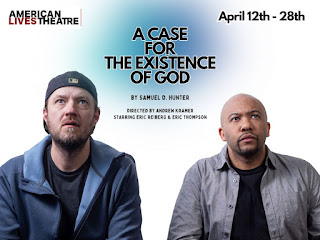ALT's 'A Case for the Existence of God': Anything you can suffer I can suffer better?
Unaccustomed as I am to reviewing the next-to-last performance in a run, I was not surprised to find
the American Lives Theatre production of "A Case for the Existence of God" so solidly embedded in the two actors' performances Saturday night.
On Phoenix Theatre's Russell Stage, Eric Reiberg and Eric Thompson had every detail as well as the large, turbulent arc of Samuel D. Hunter's play thoroughly in hand.
Directed by Andrew Kramer, the 90-minute show captures the audience's engagement from the start. A torrent of words and shifts in two men's relationship in a small Idaho city ensues.
It's a tribute not only to the writing but also to the evident commitment of Reiberg and Thompson to their tasks that within a few minutes I was thinking: "Okay, you guys, I'm thoroughly in this thing. Wherever you take me I'm ready to go." And that stuck, though I had to question some of the turns the dialogue takes, as if Hunter couldn't bear to leave out any nuance of the relationship.
We've all seen plays that arouse our skepticism at first, only to chip away at it over the distance and shift us to a place of satisfaction. This production was different from that. From the first, the comic distance between mortgage broker Keith and a financially desperate applicant Ryan was engaging enough. There would turn out to be several more shifts in the power status of the two, skirting the boundaries of friendship and finally crossing them. And there is a deepening of understanding between men whose familiarity with the same small town ironically hindered the formation of a common bond.
Ryan's perception, voiced aloud with some hesitation, that he shares a similar kind of sadness with Keith is key to understanding the emerging and unlikely friendship. His apparent lack of intelligence turns out to be an illusion. Keith's mastery of his profession also has a false connection to his personal life.
When Ryan recalls his trip to an isolated cabin in the countryside — to a landscape which, it seems, southern Idaho has in abundance — his imagination subtracts almost everything in the environment to allow him to know better what nothingness is like. Both men gradually restore meaning and substance to their worlds despite the trials that await them. Is that process self-generated or something enabled by a power beyond them?
This question gets at the peculiar title Hunter chose for his play. If there were more than one further performance of the show, the consumer-advisory aspect of this review might offer reassurance that no theological perspective is explicit in "A Case for the Existence of God." As it is, I'll just offer a hint at what God's existence might involve in the circumstances of these two provincial characters as they seek stability as parents and citizens. Whatever internal resources they bring to bear on their problems will not be enough, the play proposes.
Reinhold Niebuhr, a prominent 20th-century theologian influential to me after I departed the Christian faith, propounds the Reformation insight that divine "grace," a force so mysterious that it almost requires scare quotes, is not a power God bestows on humankind but "a divine mercy toward man which brings his uneasy conscience to rest despite the continued self-contradiction of human effort upon every level of achievement."
This difficult condition is the only resolution the playwright suggests, in my view. Keith and Ryan will continue to contradict themselves, but they are likely bring their uneasy consciences to rest from time to time, thanks to what they've shared with each other, also rising above vicitimhood. If you can catch the production's finale this afternoon, see if you agree. At any rate, the enactment of their difficult journeys in this production could hardly be better.




Comments
Post a Comment